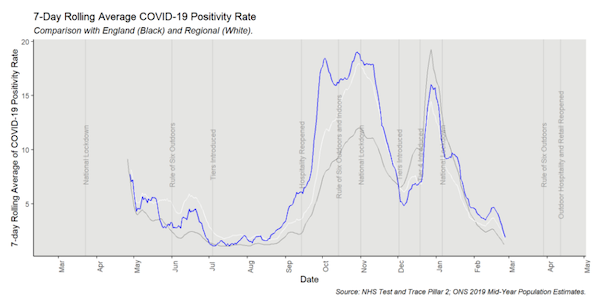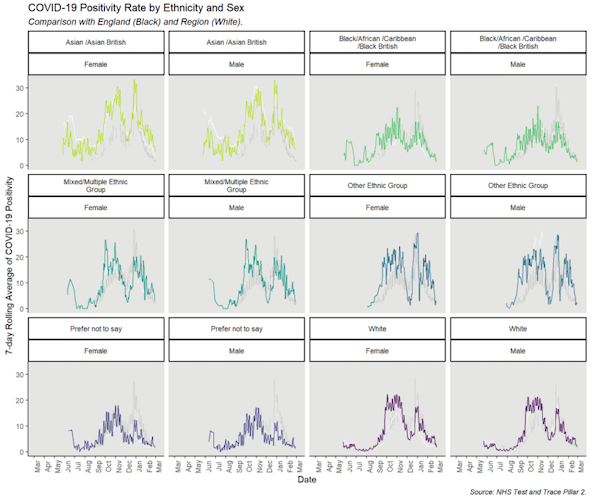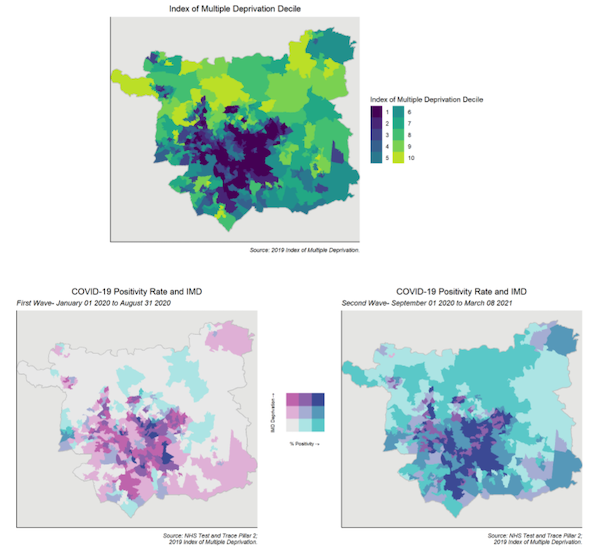Local Data Spaces
Local Data Spaces co-designed a series of 10 reports alongside 25 Local Authorities using secured data held within the ONS Secure Research Service (SRS), extending analysis to all Local Authorities in England.
Project overview
Local Data Spaces (LDS) is a collaboration between the Joint Biosecurity Centre (JBC), the Office for National Statistics (ONS), and ADR UK, set up in response to local authority and local stakeholder user needs arising from the Covid-19 pandemic. As part of a six-month pilot project we co-designed research alongside 25 local authorities, producing a series of 10 reports around the themes of small-area socio-demographic inequalities in Covid-19 transmission, testing uptake, and the economic impacts of Covid-19 on mobility and at-risk sectors. Although our work was co-designed alongside 25 local authorities, we extended analysis producing reports for all local authorities in England, alongside the openly-available R code for reproducibility.
Data and methods
Our Local Data Spaces ADR UK Research Team comprised of four CDRC academics with various research expertise including health inequalities, economics and human mobility. This project was set up to help local authority Covid-19 pandemic response, and our research team was given access to the highly-granular line-level secured health and related national datasets within the Office for National Statistics (ONS) Secure Research Service (SRS) to support this response.
During the six-month project, we worked with 25 local authorities in a host of initial meetings alongside the JBC to unpick and understand local contexts, priorities, research needs and methods of engagement. Through these meetings, we identified opportunities for collaboration and worked together to co-design analyses and outputs to support local-level policy decision and Covid-19 response. Together, we decided upon 10 reports that covered the themes of: Demographic Inequalities in COVID 19; Ethnic Inequalities in COVID 19; Geospatial Inequalities in COVID 19; Excess Mortality; Occupational Inequalities; Population, Housing and Affordability; Industry Densities; Economic Vulnerabilities; Social Economy and Human Mobility. Although our work was co-designed alongside 25 Local Authorities, we extended analysis producing a series of 10 reports for all local authorities in England with the accompanying openly-available R code.



All our analyses were completed using R, and made use of the highly-granular securely held datasets within the ONS SRS. We used secured core national datasets such as NHS Test and Trace, COVID-19 Infection Survey, The Business Structure Dataset (BSD) and the Business Registry and Employment Survey (BRES), and produced non-disclosive data outputs that contained local level data for each local authority in England. These data sources were supplemented where relevant with openly available data such as the ONS Population Estimates, Google Mobility Data, and CDRC-held datasets such as the CDRC Business Census and Access to Healthy Assets and Hazards (AHAH). These non-disclosive datasets were then used externally to generate the descriptive analyses, visualisations and reports.
This scale of work was a first for the ONS SRS but highlights the strong foundation and future feasibility of this type of collaborative secured analyses within the SRS infrastructure. Additionally, it was vital that analytical scripts, written in R, were made available and could be re-used by local authority analysts and researchers in the future, enabling rapid reproduction and even extension of this work.
Key findings
The ONS SRS is a treasure trove of highly granular administrative and survey datasets with comprehensive and consistent coverage across local areas (with standard small area survey limitations). By working to provide cleaning and formatting R scripts for these large datasets, such as the NHS Test and Trace Dataset and COVID-19 Infection Survey, we were able to generate non-disclosive data outputs for each local authority in England. Using the ONS SRS in this way, as a portal to the highly granular datasets and exporting non-disclosive aggregates, we were able to showcase the scalability and future applicability of this secured environment to support locally-focused research analyses.
Local authority engagement was vital to the generation of relevant, and valued robust research to support Covid-19 response. However, from our meetings with local stakeholders, it became clear the huge variation in resources available for research and analytical capacity, and that the Covid-19 pandemic has stretched resourcing within local authorities. Local authorities co-designing analyses alongside the research team ensured that the 10 reports generated were relevant and useful, and helped fill evidence gaps at local levels. Local authorities are now quickly and succinctly able to uncover the relative local impact Covid-19 has had across a range of health, human mobility, and economic themes. Locally focused research and data are clearly in demand. Ensuring that scaled, replicable and reproducible work is generated consistently for all local areas across the country is key for these rapid-response studies and research pieces – limiting the time-consuming data cleaning and wrangling process which may be non-trivial for many analysts and datasets.
Value of the research
The primary benefit of these reports will be to all local authority areas across England. As part of the co-design, these reports were shared with the 25 local authorities involved in the six-month project for feedback. They were well received, particularly when highlighting the SRS infrastructure to access granular secured data not currently available to the local authorities. We hope this work will inform local-level policy decisions and understanding on the variation in impact the Covid-19 pandemic has created across socio-demographics, neighbourhoods and sectors. Through the series of 10 reports for each local authority, we sought to paint a picture of the impacts of the pandemic, and provide regional- and national-level comparisons where possible to highlight the relative local level impact.
Additionally, the openly-available code used to clean and format these datasets and produce final reports will save an invaluable amount of a local authority or stakeholder researcher’s time – already heavily strained. We hope this may empower all local authorities, and particularly those with lower analytical capability to be able to access granular data to inform local level evidence bases.
“This pilot has demonstrated the value of linked administrative data at a local level and has supported the complex needs of local authorities to respond to the Covid-19 Pandemic. The four highly-skilled academics seconded to this project have developed a very valuable resource, and I look forward to seeing how the insights are taken forward by local authorities across England.” Dr Emma Gordon. Director, ADR UK & ADR England
“The Local Data Spaces pilot has encouraged local authorities to tap into the potential of our Secure Research Service, with tailored access and expert advice. It is especially good to see research made available for all local authorities in England to assess the impact of COVID-19 on their local areas which may help to inform their decision making.” Vic Chenery. Pandemic Research and Coordination, Office for National Statistics.
Insights
- Local authorities have varying analytical capacity and capability, stretched thin during the Covid-19 pandemic.
- By generating a series of 10 reports for each local authority in England, we sought to fill these analytical gaps and support local level Covid-19 response.
- We showcased the demand for working alongside local authorities to co-produce research and the scalability of this work, using the ONS SRS as a secured environment.
Research theme
- Health informatics
- Urban analytics
- Statistical and mathematical methods
People
Simon Leech, Data Scientist Intern, University of Leeds.
Dr Mark Green, Senior Lecturer in Health Geography, University of Liverpool.
Dr Jacob Macdonald, Research Data Scientist, University of Liverpool.
Dr Maurizio Gibin, Senior Research Fellow, University College London.
Partners
Administrative Data Research UK (ADR UK)
Office for National Statistics (ONS)
Joint Biosecurity Centre (JBC)
Department of Health and Social Care (DHSC)
Consumer Data Research Centre (CDRC)
Funders
Administrative Data Research UK (ADR UK).
